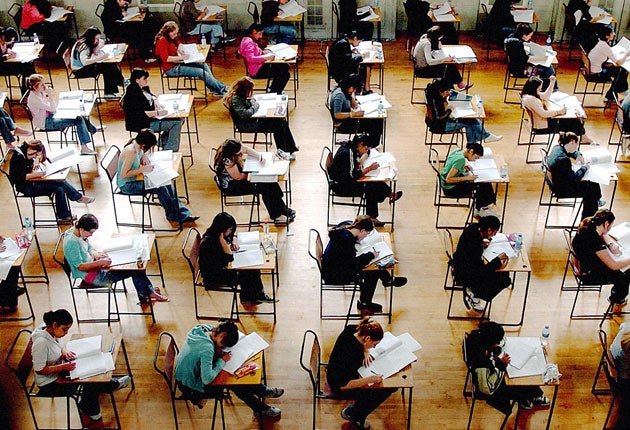The science of exam stress: Beating the study blues
Stress might be useful for dodging sabre-toothed tigers, but it doesn't help so much with exams

The majority of us have, at one time or another, been in a situation where you sit down at the desk and open your exam paper, only to realise that somewhere between the door and your seat, all of the information that you've been revising for the past few months has leaked out of your ear. You start to panic because you’ve completely forgotten a year's worth of work and all you can hear is the ticking of your watch as it counts down the minutes until the end of the exam.
This particular form of stress is known as exam anxiety and some people are more susceptible to it than than others.
Stress is a natural, healthy bodily response which humans have evolved in order to protect them in times of danger. When an individual is faced with a stressor, a hormone is released within the body which causes various physiological changes; the heart begins to pump faster in order to supply the body’s muscles with a larger supply of oxygen, blood pressure therefore increases and the body perspires more to prevent over-heating due to the body’s increased metabolic rate. Although this evolutionary advantage is excellent at preparing the body for a fight with a wild tiger, it’s not as magnificent when it comes to students and their exams.
Read more: 10 ways to beat exam stress
According to findings by social research psychologist Martyn Denscombe, teenagers suffer from exam stress for four reasons. The educational or occupational consequences associated with the outcome of the exam; their self-esteem with regards to the outcome of their grades (students are likely to have a higher self-esteem with higher grades); judgements from friends and parents in relation to to their performance; and fear of disappointing their teachers.
So what can you do?
Firstly, you need to remember that although it feels like the most important thing in the world, this test isn’t worth the physical strain that you’re putting on your body. When you’re feeling the effects of exam anxiety and your brain feels blank, take a drink of your water and breathe deeply and slowly. This will allow your body to rehydrate and to stop the effects of the stress response.
Many teachers, friends and family believe that they are further the students by saying “if you don't get an A-grade you won’t get a job” but it can actually cause increased pressure for the individual. It could be an idea to sit down with your family members before-hand to discuss realistic expectations so that there isn't too much pressure being put on the student.
Why do we become forgetful and how can we avoid it?
Excessive anxiety can make it almost impossible for the student to focus on their exam and it is often the case that they struggle to recall things that they have studied. This is because - due to that pesky evolutionary response again - the body releases large amounts of the stress hormone known as cortisol during times of stress. Studies have shown that cortisol impairs the speed of memory retrieval in humans.
Nutritional biochemist Shawn Talbott’s research shows that there is 50 per cent more cortisol in the blood stream if an individual has six hours' sleep instead of the recommended eight hours. It is also important for you to maintain a nutrition-rich diet, drink plenty of water and eat three meals a day; this will keep the cortisol hormone at a natural level and allow you to concentrate fully on the task at hand.
Examination anxiety before the exam begins
Some people find that after suffering a highly stressful test once, their past experiences create schemas for how they expect future exams to be and therefore become more and more stressed in the lead up to their exams. This form of chronic stress causes all of the same physiological changes as the immediate stress response but over a longer period of time. This can cause high blood pressure, heart disease and seriously weaken the immune system.
Chronic stress is difficult to overcome as it tends to build up over a period of time. With this information in mind it is important to identify potential future stressors at the beginning of the educational year and to plan your revision timetable and making sure that you attend your lectures throughout the year in order to make it easier for yourself when it comes to the exam period. The typical student stressor is leaving their projects and work till last minute, always using the excuse that they work better with a tight deadline; we all know from experience however, that students are actually just too laid-back.
Join our commenting forum
Join thought-provoking conversations, follow other Independent readers and see their replies
Comments
Bookmark popover
Removed from bookmarks